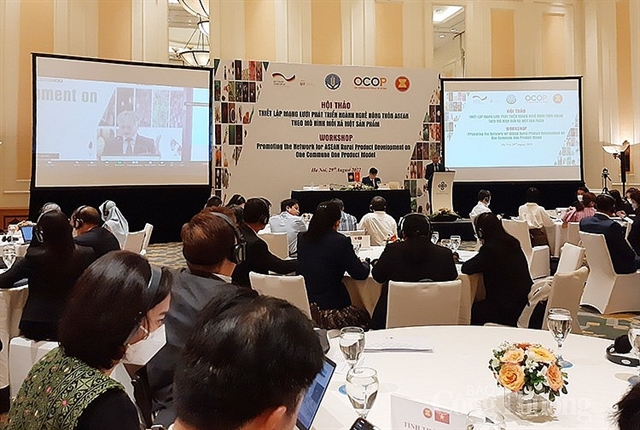 Economy
Economy


|
| The "Establishing an ASEAN Rural Industry Development Network under the OCOP Model" workshop in Hà Nội on Monday. — Photo congthuong.vn |
HÀ NỘI — With great potential and room to develop agriculture, ASEAN is looking to further promote local resources for rural economic development.
"The OCOP (One Commune, One Product) model, when utilised in developing ASEAN agricultural industries, will look to promote cooperation, partnership and network activities to promote the potential strengths of rural areas, as well as promote the creativity of the community in rural industrial development," said Nguyễn Hà Huế, Deputy Director of the Department of International Cooperation, Ministry of Agriculture and Rural Development.
"We aim to share experiences, solutions and policies among countries in developing the OCOP model, as well as connect with partners to support the development of trade and marketing for OCOP products from ASEAN countries," said Huế. "We also look for funding and technical assistance from non-ASEAN partners, and sharing fundamental knowledge between ASEAN, as well as its national and regional partners."
In order to promote cooperation, partnerships and networks to develop rural industries and small and medium enterprises in rural areas, and actively contribute to the socio-economic development of countries, thus creating the shared prosperity of the ASEAN rural area, Việt Nam proposed the initiative "Establishing the ASEAN Rural Industry Product Development Network according to the OCOP model" at the 41st ASEAN Agriculture and Forestry Ministers' Meeting in Brunei in 2019 and the 11th ASEAN Ministerial Meeting in Myanmar on Rural Development - Poverty Reduction in 2019.
In October 2020, the 42nd ASEAN Agriculture and Forestry Ministers' Meeting (AMAFF42) approved the initiative and the network was named "ASEAN OCOP Network".
The workshop "Establishing an ASEAN Rural Industry Development Network under the OCOP Model" took place in Hà Nội on Monday to formally establish and discuss the Network's action plan and share experiences on rural sector development of ASEAN Member States and international organizations.
Phương Đình Anh, Deputy Chief of Staff, Office for Coordination of New-Style Rural Areas said, "Việt Nam has 8,340 OCOP products with higher than 3-star certification, more than 60.7 per cent of OCOP model manufacturers with 3-star certification or higher have an average annual increase in revenue of 17.6 per cent, and the selling price of products after being officially recognized by OCOP increased by an average of 12.2 per cent."
"The programme has contributed to creating jobs for workers, especially promoting the role of women and ethnic minorities. Việt Nam has set a specific target to have at least 10,000 OCOP products by 2025," said Phương.
Some key solutions that Việt Nam has set out in the near future to develop the OCOP model are to improve support mechanisms and policies to help manufacturers improve production, trade and product processing capacity. Products with advantages to promote regional identity are a focus in development. The quality, technical regulations, packaging and branding of products should also be improved. Networks connecting domestic and international OCOP products in the direction of green and sustainable products are also a key point.
According to many delegates, the development of the OCOP program must be on the basis of supply and demand, associated with each region's own conditions, potential and advantages, and localities should not blindly jump on the bandwagon.
The Government and localities should also foster and support enterprises, cooperatives, organizations and individuals to develop and manufacture OCOP products. — VNS




